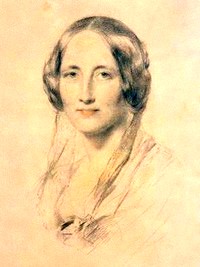North & South: Industrial Progress Reducing Poverty (and Terrorism)
[Updated from earlier post on earlier freedom vs. equity value debate topic]
For students researching and debating the foreign aid reform and international terrorism debate topics, Elizabeth Gaskell’s novel, North and South offers food for thought. The novel contrasts the traditions and values of the “old order” in the aristocratic south of England with the “new order” in the rapidly industrializing north. In the south people know their place and society is stable. But in the manufacturing towns in the north, textile mills are transforming society, offering higher wages and disrupting traditions and social stations. The fast expanding textile industry bring risks too, with busts following booms.
Across the developing world, industry along with international trade and investment are transforming traditions in long-impoverished societies. North and South looks at the conflicts and challenges as northern England industrialized in the mid-1800s. After long delay, that industrialization, now part of globalization as Hernando de Soto argues in the beginning of Globalization at the Crossroads, is spreading prosperity (and conflict) across Asia, Africa, and Latin America.
In addition to the novel, the BBC miniseries is now streaming [update March 2023] on Apple TV

Wikipedia says of North and South:
The serial is based on the 1855 Victorian novel North and South by Elizabeth Gaskell and takes place in the years surrounding the Great Exhibition of 1851. It was adapted for television by Sandy Welch and directed by Brian Percival.
[Angus] Deaton, an economist at Princeton University who studied poverty in India and South Africa and spent decades working at the World Bank, won [the Nobel] prize for studying how the poor decide to save or spend money. But his ideas about foreign aid are particularly provocative. Deaton argues that, by trying to help poor people in developing countries, the rich world may actually be corrupting those nations’ governments and slowing their growth. According to Deaton, and the economists who agree with him, much of the $135 billion that the world’s most developed countries spent on official aid in 2014 may not have ended up helping the poor.
The 1999 World Trade Organization summit in Seattle, Washington, vividly revealed the wide opposition to globalization, drawing a huge force of protesters from both poor countries and wealthy ones. Many of the protesters would agree with the arguments of Jeremy Brecher and Tim Costello, who have asserted that the WTO “work[s] hand-in-hand with the IMF and the World Bank to impose the Corporate Agenda on developing countries.” This corporate agenda, they write, seeks “to reduce all barriers to downward leveling of environmental, labor, and social costs” The American Friends Service Committee went so far as to claim that globalization “has undermined basic rights, cultural and community integrity, the environment, and equity … [and] caused economic insecurity.” Critics point out that it has also lessened the importance of nations that once could use their resources or strategic locations as bargaining chips for aid, and has helped to create global disasters like the banking crisis in Asia in 1997–1998.
So, is industrialization and globalization allowing billions around the world to earn higher incomes, or is capitalism and global trade somehow grinding the world’s poor deeper into poverty (while hurting middle income workers in developed countries)? These are questions worth researching as students debate foreign aid, legal immigration, and international terrorism.
At one time, behind the debate was an ideological argument between the critics
(especially Marxists) and the defenders of free markets. The critics, or pessimists, saw nineteenth-century England as Charles Dickens’s Coketown or poet William Blake’s “dark, satanic mills,” with capitalists squeezing more surplus value out of the working class with each passing year. The defenders, or optimists, saw nineteenth-century England as the birthplace of a consumer revolution that made more and more consumer goods available to ordinary people with each passing year. The ideological underpinnings of the debate eventually faded, probably because, as T. S. Ashton pointed out in 1948, the industrial revolution meant the difference between the grinding poverty that had characterized most of human history and the affluence of the modern industrialized nations. No economist today seriously disputes the fact that the industrial revolution began the transformation that has led to extraordinarily high (compared with the rest of human history) living standards for ordinary people throughout the market industrial economies. [Source]


